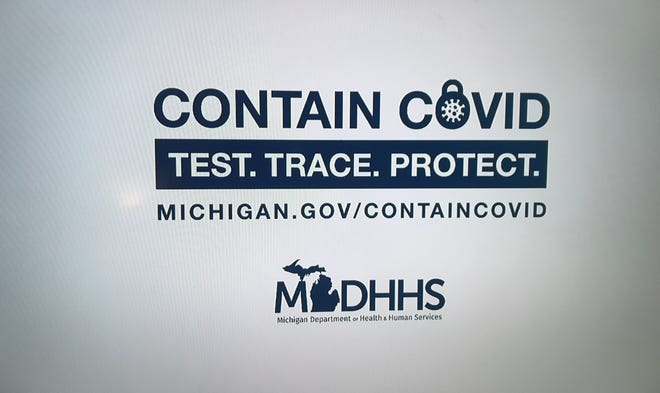Michigan health adviser tied to contact-tracing contract hasn't cooperated in probe
Lansing — A senior adviser for the Michigan Department of Health and Health Human Services wouldn't cooperate with an inquiry into the controversial, no-bid contact-tracing contract awarded to a Democratic political consultant's firm, according to newly released documents.
State Rep. Ann Bollin, R-Brighton Township, asked the Michigan Auditor General's Office to look into the contract, which Democratic Gov. Gretchen Whitmer's administration canceled amid widespread criticism in April. Bollin sought answers to 20 questions about how the contract was awarded and how personal data would have been handled.

The Auditor General's Office, which is tasked with improving accountability in state government, provided responses on July 31 after reviewing internal documents and interviewing eight state officials. But the auditor general's report said Andrea Taverna, senior adviser on opioid strategy, wouldn't discuss the matter.
That's despite the fact that "many of the interviewees referred us" to Taverna, according to the Auditor General's Office. Taverna was the person "primarily in charge of contact tracing," the office's report added.
"However, this individual referred us to her attorney, who informed us that 'At this time, Ms. Taverna continues to decline the opportunity to discuss these issues,'" the report continued.
Taverna was working with the state through a $75,000 contract with the Michigan Department of Health and Human Services and the Michigan Public Health Institute, according to documents obtained by The Detroit News. She is a former chief of staff to the Council of Economic Advisers in the Obama administration.
On April 30, Democratic Attorney General Dana Nessel said her office would investigate the contract. Her office declined comment Friday, citing the ongoing investigation.
"No one, with an ongoing AG investigation, would agree to have this interview," tweeted Emily Schwarzkopf, director of legislative, appropriations and constituent services at the Michigan Department of Health and Human Services, about Taverna's lack of cooperation with the auditor general probe.
Contact tracing is a crucial part of the state's efforts to stem the spread of COVID-19. By determining the close contacts of those who test positive for COVID-19, health officials hope to isolate people who have been infected and prevent the virus from spreading.
Michigan Department of Health and Human Services Director Robert Gordon will testify Thursday before the state Joint Committee on the COVID-19 pandemic about the state's contact tracing efforts, including the contract in question.
Lawmakers initially requested Taverna and HIV/STD programs division director Kathryn Macomber testify on the contract, but the department instead offered Gordon, said state Rep. Matt Hall, the Marshall Republican who chairs the committee. Before Michigan, Gordon worked as a senior vice president at the College Board as well as at the U.S. Department of Education and the Office of Management and Budget during the Obama administration.
The committee still would like to hear from Taverna and Macomber, Hall said.
"They seem to be the ones who have the knowledge of what happened here with the contract," Hall said. "...We want to get answers for the people of Michigan about why those things happened.”
The state initially tapped Great Lakes Community Engagement, tied to Democratic consultant Michael Kolehouse, to help with data collection as part of the effort. But Whitmer's administration canceled the $194,000 contract after it received media attention in April.
In addition to his ties to Democratic political efforts, Kolehouse wrote in March on Facebook that he hoped President Donald Trump would get "coronavirus ASAP."
Emails obtained by The News previously showed that Ed Duggan, senior adviser at the Department of Labor and Economic Opportunity, introduced Kolehouse to Taverna in a March 25 email. Duggan described Kolehouse as someone who “does some organizing and can help on some efforts," according to emails provided in an open records request.
There was no formal process for soliciting bids for the contract tracing project, according to the Auditor General's Office.
Health department officials told the Auditor General's Office that "normally employees would need to follow the procurement process and solicit bids; however, since Michigan was under a state of emergency, there was an exemption from soliciting bids."
"K2K Consulting, LLC was the only firm considered" for the contract, the office added in response to another of Bollin's questions.
"Initially, MDHHS was working specifically with Kolehouse and it started out as pro-bono work, but soon both parties realized the overwhelming amount of work to be done so they moved to developing a contract," the office's responses added.
Bollin also asked, "Who made the request for contact tracing be completed by an outside consultant?" The office said it couldn't obtain an answer to the question because Taverna declined an interview request.
"MDHHS interviewees stated that they did not think that MDHHS had the capacity to develop an efficient contact tracing system internally, so it became apparent that an outside contractor would be needed," the office added.
In a Friday statement, Bollin said she is seeking additional information on the canceled contract after receiving the responses.
"I’m grateful to the Auditor General for investigating this issue and finding answers to my questions," Bollin said. “The information the Auditor General’s Office has uncovered sheds important light on the decisions that were made by Gov. Whitmer’s administration. It also generated additional questions, which their office has agreed to continue investigating."
cmauger@detroitnews.com